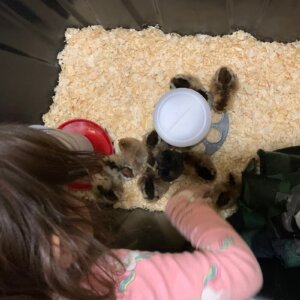A slightly battered chicken coop underneath a shade tree a few miles south of the Columbia River is a barracks for soldiers in the war against communicable disease. The coop houses the Western Umatilla Mosquito Control District’s sentinel chickens, the area’s first line of defense against West Nile Virus, St. Louis Encephalitis, and Western Equine Encephalitis.
Every two weeks during the summer—the prime season for mosquito-borne disease—the chickens undergo a brief blood draw. The samples go to a lab in Portland for testing. If virus is found, local authorities know to step up their surveillance and prevention efforts. Happily, no virus has been detected in any of their chickens since the program began in 1998.
Sentinel chickens are spread across the U.S., protecting Americans from disease. In Pinellas County, Florida, 53 sentinel chickens tested positive for West Nile Virus in 2015. Due to prevention efforts, only 1 human was infected.
Los Angeles County keeps a flock of 400 chickens at a park in Long Beach.
Chickens protect the tech giants of Silicon Valley from disease. Here’s a chicken sentinel keeper in San Mateo County—home to the HQs of Facebook, Oracle, and Electronic Arts—showing off one of their “employees.”
Happily, chickens infected by West Nile Virus endure only minor discomfort, and fully recover. They can no longer be used as sentinels, since the virus antibodies stay in their system forever, but they are safe to be around people or even to eat. Often “retired” sentinels are given away as pets.
In Africa, keeping chickens may ward off the most dangerous mosquito-borne disease of all, malaria. Research shows that the smell of chickens repels the species of mosquito that is most responsible for spreading malaria. Scientists aren’t sure why—it could be because chickens eat this species of mosquito, or because chicken blood isn’t as appealing as that of other species. Either way, they are working to isolate the particular compounds, which could serve as an organic mosquito repellent.
Sentinel chickens may eventually help protect us from another African mosquito-borne virus—Zika. No test yet exists for detecting Zika virus in chickens, but if one is developed, chicken sentinels could warn of that disease as well—hopefully helping to prevent the tragic birth defects it can cause.










































Leave a Reply